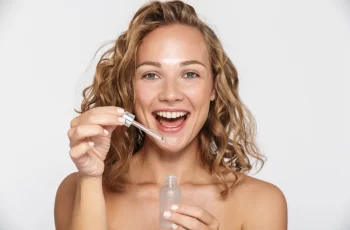Do You Need a Skin Care Fridge?
A new beauty trend is to purchase a mini beauty skin care fridge to store skin care products, makeup, and cosmetics.
Revolve, Walmart, Amazon and The Skin Spot are just a few of the stores where you can find a skincare fringe to buy.
But- is having a separate refrigerator for skincare products and makeup really necessary?
A skin care fridge is really only worth it when it is difficult to easily access the refrigerator in your kitchen. For example- if your bedroom and bathroom are upstairs and the kitchen is downstairs.
I notice that my patients are less likely to use their skin care products when they are kept in the fridge- especially if they don’t want to run thru their house in a towel to the kitchen.
For this reason- having a mini fridge in the bathroom or closet may be a good idea for you.
Should you refrigerate your skin care products?
Skin care products are tested at room temperature (and warmer) and this is how shelf life and expiration dates are determined. Most products have a 2 year shelf life. However, these tests are done on unopened products. Once the products have been opened, they can lose effectiveness fast.
Is it better to keep products in a skin care fridge? It depends upon the ingredients in the product.
Five reasons to store skin care in the refrigerator:
It feels good when you use them cold.
You have skin inflammation and the cool is soothing.
The products have ingredients that degrade quickly.
You want to extend the life of your products.
You use organic products with no preservatives
Ingredients in skin care that should be refrigerated when possible.
It is not required to refrigerate these ingredients, but if you do- they should remain effective longer:
Ascorbic acid (Vitamin C)
Clascoterone
Hydroquinone
Niacinamide
Peptides
Retinol
Water soluble ingredients like green tea can be refrigerated,
Oil soluble ingredients and oils may get firm when refrigerated, so they can be refrigerated but should be brought back to room temperature before application if they are too thick to spread.
What Products Should Be Kept In a Skin Care Fridge?
These are the product types that should be kept in the fridge if possible:
Skin lightening products
Anti-redness products and anti-inflammatory serums
Probiotics (1)
Vitamin C Serums
Retinoid Serums
Toner
It is ok to keep toner in the fridge.
It is not necessary to store toner in a fridge, but if you like the cool feeling of a cold toner, it is fine to keep it refrigerated.
Facial mists and essences can also be kept in the fridge.
Face cream
Face serums are a good product to keep in the fridge. They are usually made with water soluble ingredients that can evaporate or react with other ingredients in the products which can make them less effective. Vitamin C serums, retinol serums, and skin lightening serums should be kept in the fridge if you leave them behind while travelling so they will stay fresh.
Face Serums
Should I store face serums in a skin care fridge? You can keep face cream in the fridge but it may make some of the oils in the moisturizer thicken which makes it harder to spread.
Letting the cream warm up in your hand before applying will solve the thickness problem.
Keeping creams in the fridge can make them last longer.
Vitamin C
Vitamin C is water soluble and should be stored in a skin care fridge once opened. It is able important to keep it away from light when possible.
One idea is to store it in a paper bag in the refrigerator .
How long to wait to use products after taking them out of the refrigerator?
Room temperature products will penetrate better into the skin then cold products. But of course it also depends upon how cold your room is. In a 72 degree (F) room (22 degrees C) you should let products sit about 30 minutes before you use them.
Washing your face with warm water before you apply them will also help speed penetration.
Downsides of refrigerating skincare to keep it cold
Cold makes blood vessels contract so this could decrease absorption of products like exosomes and growth factors that depend on the blood supply to the skin to absorb well.
If you use any of these ingredients- let them come to room temperature before applying to your skin:
Exosomes
Glycosaminoglycans
Growth Factors
Heparan sulfate
Hyaluronic acid
Oils
What not to put in a skincare fridge?
These do not last longer when stored in cold temperatures:
Clay masks
Exfoliating Scrubs
In general, you want to consider keeping ingredients that change textures too much in the cold out of the fridge. This can include oils like coconut oil which are right in saturated fatty acids. Saturated fatty acids somewhat solidify into creams when cold, while unsaturated fatty acids develop a filmy texture. Additionally, some acids are less potent when cold, while some are more potent. Be sure to keep the recommendations on temperature storage found on products labels in mind when storing your products.
Can I leave my skincare fridge on all night?
You can leave skin care products in the mini fridge all night.
Do not put skin care products in the freezer.
It is not necessary to store skin care in the fridge but it may make them last longer. This is important- especially with serums that can be expensive.
Tips for making skin care products last longer:
If you go on a trip you should leave your skin care products that you do not take on the trip with you in the fridge- especially if you live in a warm climate with spotty air conditioning.
Never leave your skin care products in a hot area such as your car. This will inactivate many ingredients including chemical sunscreens.
If you plan to cycle your skin care products- keep the ones you won’t use for a few days in the fridge.
Before you buy any skin care products, make sure you are using products that are right for your Baumann Skin Type.
DQH Knowledge drop: In your 20s, your skin cell turnover decreases. (Cell turnover is a key component in keeping your skin youthful.) You know what else slows down? Your collagen production. Starting in your 20s, collagen decreases by about 1 percent per year. Should you want to prevent fine lines and wrinkles, start by eliminating behaviors that contribute to premature aging. “If it’s bad for you, it’s bad for your skin,” says dermatologist Michel Somenek.
“Cigarette smoking reduces blood flow to the skin and causes premature wrinkling and a dull skin texture. Making the repeated pursed motion to inhale can also cause smoker’s lines. Alcohol and recreational drugs are toxins for the skin that damage its cellular structure and DNA,” Somenek tells us. “The faster you eliminate vices while you are young, the better chance your skin and body have to recuperate.” Also, adopting an anti-aging routine in your 20s is key. After all, the best offense is a good defense. We spoke to Somenek and experts Joshua Ross and Audrey Kunin to find out more.
Keep reading for the best anti-aging products for your 20s, according to skincare professionals.
Sunscreen
“We all know that the sun is the number one cause of skin aging and starting the prevention in your 20s is very important,” Ross says. “The majority of your sun damage won’t start to appear until you’re in your 30s, so don’t wait until you see it surface or you’ll be behind the curve. Stay ahead of it with a good-quality zinc-based sunscreen worn daily.”
Farmacy Green Defense Daily Mineral Sunscreen
An invisible sunscreen with SPF 30, plus botanical extracts meant to protect skin with tons of antioxidants. Bonus: It’s clean and fine to use under makeup.
Bareminerals Complexion Rescue™ Tinted Moisturizer Broad Spectrum SPF 30
Although we recommend you use your SPF and moisturizer separately, we also understand moments when you don’t have time or energy for that extra step. For those times, this bareMinerals moisturizer is a great thing to have on hand.
Vitamin C Serum
“A great introduction to anti-aging is to start with a vitamin C serum in your morning skincare routine,” Ross says. “It’s a powerful antioxidant that will neutralize free radicals and brighten the skin.” He adds that it’s a great way to counteract the effects of the sun’s harmful rays, which, as previously mentioned, are among the biggest causes of premature aging.
Drunk Elephant C-Firma™ Vitamin C Day Serum
The Drunk Elephant C-Firma is a lightweight serum that promises to give skin a glow by combining the brightening powers of vitamin C with ferulic acid, l-ascorbic acid, and vitamin E. The included sodium hyaluronate is meant to replace hydration loss, so you shouldn’t have to deal with any irritation.
Sunday Riley C.E.O. Rapid Flash Brightening Serum
This potent serum is jam-packed with vitamin C (15 percent, to be exact), which means it’s a potential superstar at both brightening skin and dousing it in antioxidants.
Peptides
Using peptides on your skin has many benefits, says Somenek. “The skin barrier is what defends the body against pollution, UV rays, bacteria, and toxins. It can be damaged by several everyday factors. Using topical peptides aids in building a stronger barrier,” he says. “Peptides comprise elastic fibers, which are a type of protein. These fibers help to make skin appear taut and firm. Peptides can also help repair damaged skin, relieve inflammation, and even out skin tone. Some peptides can kill acne-causing bacteria that is common in 20-somethings.”
Kunin agrees, saying, “Peptides are an excellent entry point for supporting collagen.” She recommends looking for face and eye treatments that contain these collagen-boosting powerhouses.
Charlotte Tilbury Magic Eye Rescue Cream
This Charlotte Tilbury super-emollient eye cream has a base of coconut oil and shea butter (read: it’s incredibly hydrating). Botanicals plus peptides are meant to help reduce dark circles and boost collagen, respectively.
This creamy moisturizer serves up potent collagen-boosting peptides and pycnogenol, and antioxidant-rich vitamin C. “Instead of sitting on top of the skin, peptides penetrate the outer layer so they go deep. The ‘signals’ they send tell the cells to produce elastin and collagen, which are needed for youthful-looking skin,” explains Somenek.
At-Home Peel Pads
Remember that skin cell turnover fiasco we talked about earlier? One way to help support it is by exfoliating. “Exfoliation is important to help keep skin fresh and luminous,” Kunin says. She recommends using at-home peel pads as an easy and effective way to exfoliate.
“The goal in your 20s is to fight the slowing pace of cell turnover. It is wise to use products that gently exfoliate, yet still remove oil and other impurities. Products that have Alpha Hydroxy Acids (AHA) or Beta Hydroxy Acids (BHA) are a good choice.”
According to Somenek, you should only exfoliate two to three times a week. “People of all ages are guilty of over-exfoliating and that can be too much of a good thing,” he says.
Dermadoctor Kakadu C Intensive Vitamin C Peel Pad
A few swipes of this Derma Doctor powerful peel pad promise to leave your skin glowing and smooth, thanks to the seven (yes, seven) types of chemical exfoliants, including AHA and BHA. It also contains vitamin C via Kakadu plum extract for added brightening and antioxidant protection.
KEY INGREDIENTS Kakadu plum extract is sourced from the Kakadu plum, a fruit grown in northern Australia. It contains vitamin C, which restores the skin’s natural barrier, increases collagen production, and soothes irritation.
Dr. Dennis Gross Skincare Alpha Beta® Universal Daily Peel Pads
These are the gold standard of peel pads, with a cult following and over 900 five-star reviews on Sephora. They’re easy to use and contain a blend of anti-aging exfoliating acids.
Emollient Night Cream
“In your 20s, you need to start upping the hydration in your skincare routine. You may have been cautious of over-moisturizing because of acne in your teens, but as you enter your 20s, your skin transitions and becomes drier,” Ross says. “I recommend an emollient night cream added into your evening skincare regimen.”
“Twenty-somethings need to make sure that they are not using creams that will clog their pores and cause excess oil production,” says Somenek. Opt for non-comedogenic products.
Cerave Skin Renewing Night Cream
One great choice is the CeraVe Skin Renewing Night Cream, which is a non-comedogenic night cream that leaves skin soft and glowy. It combines the moisturizing powers of ceramides and hyaluronic acid.
RoC Retinol Correxion Max Hydration Creme
“The best night cream ingredients contain retinol, benzoyl peroxide, and/or salicylic acid or hyaluronic acid. The goal is to moisturize, yet remove excess oil,” says Somenek. This Roc Retinol Correxion cream fits the bill as it contains both hyaluronic acid and retinol so it promises to moisturize while also being non-comedogenic.



